- Home
- Annie Proulx
Close Range Page 22
Close Range Read online
Page 22
Bonnie passed a pan of hot biscuits, said, “You don’t believe that.”
“Kids not up yet?” Hulse looked at the three porridge bowls.
“They’re scufflin around up there,” said Bonnie, pushing a platter of eggs toward him.
Hulse roared at the ceiling, “Rattle your hocks and get on down here. We got a busy day.”
Skipper slid two biscuits onto his plate. “Angells bread of Heavens wheate…” he murmured. “That poor old doe out there, I ought a shoot her. Ears hangin down, got screwworm sure as—hangs around behind the aspen.”
“I know it,” said Noyce. “I seen her this mornin. She’ll just die slow.”
“Not enough a rancher has to take care a cows, you got the wild stuff too,” said Hulse. “The main thing about ranchin,” he went on, “last as long as you can, make things come out so’s it’s still your ranch when it’s time a get buried. That’s my take on it.” Though he had rarely seen an old rancher die on his place; they always sold out and moved to town, got themselves planted in Santa Monica or Tucson. Better to have a shotgun accident climbing over a fence.
“Amen,” said old lady Birch.
There was giggling at the head of the stairs.
“What’s so funny up there?” said Bonnie.
“It’s Cheryl, what she’s got on.” Two bare feet and legs descended a few steps. They saw the youngest girl, clad in white underpants and the pink bra Bonnie had left to dry on the shower rod. The garment hung like some outlandish harness. Rick Fissler shot a look at Bonnie and blushed.
“You got one hell of a long ways to go before you fill that out,” said Hulse. “Now get on the prod.”
“You know,” said Skipper. He poured more coffee in Hulse’s cup, his own. “It’s not like things don’t happen around here. Not plastic diapers but gates that somebody opened. Remember last summer, a dozen gates opened in the night? That wasn’t no accident. And over by Casper they have cut fence. Oh, they’re up here too.”
“They are, and it’s probably not a bad idea we spent a little time out under the stars these nice nights. Take a bedroll and a rifle and sleep out. Take turns. Wouldn’t hurt. You never see the bastards in winter.” He looked at the moist breath of the coffee rising above the cup.
Old lady Birch left the table, hunting her magazine,Today’s Christian Ranchwoman . Bonnie stirred the kids’ porridge, looked at a papaya that was shriveling on the windowsill. Why had she bought it? She disliked the womb-shaped fruits with their middles full of seeds.
THEGOVERNORS OFWYOMING
Wade Walls sat on the old sofa, drumming his fingers on his knee, glancing up now and then at the faces of dead politicians on the wall, the mass of them diffusing an oppressive mood. Many of the photographs were inscribed with sentiments—To Monty Hamp, my old pard,andTakes an SOB to know one . The living room held the bitter odor of dyed leather and dead ash.
Roany put down a plate of crackers and cheese. Renti dipped a cracker in her glass of wine.
“The food here is sickeningly bland.”
“You can find Mexican in Slope,” said Roany. “That’s what you miss.”
“That stuff out of a jar. No. I want somepozole rojo and a salad with freshnopales . I want a turkey leg with roasted peppers. God.”
A little after nine Shy walked in.
Walls had never seen a more ghastly shirt, a western cut of deliberately mismatched plaids overstitched with green and orange diagonal stripes.
Renti was hit once more by her brother-in-law’s classic western good looks; long-legged, with a sharp-beaked, handsome face, a mask of reddish stubble. He hardly glanced at her; she was what he did not like in women.
“Where have you been, Shy,” said Roany. “Wade’s been here since this afternoon. We picked him up in town.”
“Tell you what, Roany, I expected you would do that. I had a go to North Dakota. Protestin a damn dog shoot. Should a seen it—thirty guys shootin prairie dogs and about thirty big old deputies keepin us back,” he lied. He had been two nights with a very young girl in a cabin in the Wind Rivers, a Shoshone girl from the reservation. To get to the cabin they had walked through yellow alpine lilies at the base of melting drifts. A stairway cascade of glassy meltwater trickled over and between the rocks, through brilliant clusters of split-leaf paintbrush, clouds of mosquitoes and midges rising from shaken plants. He was covered with mosquito bites. The child had said little, slapped at her arms and legs. There was a stick of insect repellent in his jacket, something he carried for Roany. He held it out to the girl. She shook her head. There was no repellent that could keep him off her. He couldn’t think about it now. A wash of shame, an intention to do it again.
“How was the trip?” he said to Wade Walls.
“Turbulent. Very bad turbulence over the mountains. They kept us circling DIA for half an hour. Worst part of it.” The clay face fixed, sentences coming out as coins returned from a pay phone.
“I sure hope that’s right.” He went into the kitchen where Roany was foraging in the refrigerator for another bottle of wine. “You got anything to eat?” He wasn’t looking at her.
“Tomato soup.Canned tomato soup. And thebuffalo steaks in the freezer. We had a discussion about the buffalo steaks.”
“What, with Wade?”
“You bet.”
“Shit. What did you say?” He took the bottle from her, twisted in the point of the corkscrew. The composition cork squealed out. He must have opened a thousand bottles for her in sixteen years. Two thousand.
“Said you said buffalo was different. Than beef.” She leaned against the counter, braced hands. The position emphasized the width of her broad butt. Her nails were cut straight across in the French style, varnished a milky rose.
“What’d he say?”
“Oh, he was stern. He said, ‘Once a rancher always a meat-eater,’ or something like that. He’s like a teacher, always watching and correcting you. This’s the last time I’ll put up with it. He can stay at a motel you keep doing this stupid stuff. God, I am tired.”
“We’ll talk about it. He’s a little hard a take, I guess. I’ll have some a that soup, couple pieces a toast. Whatever you got. We’ll be goin out tonight. You want a drink?” Whiskey might get him through these complexities.
“No, I’m staying with the wine. You do what you want. You fix it yourself. I’m going to bed.” Her hands rose, pulled pins from the twist, shook the dark cascade of hair from which emanated the sudden full scent of roses, a scent he detested. She filled her glass. She was afraid of the dark and slept with the light on. Wine, she said, helped her sleep.
One of the lesser pleasures of his nights with the young girl was the deep, rich darkness which encouraged the imagination, submerged the foreboding prescience of discovery and punishment.
Faintly, from the big room down the hall came the needle sound of Renti’s voice talking long-distance on the cordless phone. She made a sound like a barking dog, laughed.
“What did they charge you with?” said Wade Walls in the living room. He had gone upstairs and changed the hemp suit for black pants and hooded sweatshirt.
“What?” He hated drinking soup out of a mug.
“Didn’t they arrest anybody? Who were you with, Prairie Dog Defense League?”
“No. I was somewhere else. Nothin a do with fuckin prairie dogs. Personal stuff. I was with somebody.”
“Look—” said Wade Walls.
“I don’t want a talk about it. It’s personal stuff. It’s personal stuff, just tears and years of old stuff.” He had been twelve years old again, excited, but supine, letting something happen. It was complicated. He became the child and the girl the adult. That was much of it, revulsion and excitement rubbing against each other. This business with Wade Walls, which he had never thought out nor weighed beyond believing it a kind of good, served him as the balance column in the ledger of his own evil doings. He had not lost the knack for ranching because he’d never had it. The subversion had been
simple enough—opening gates, letting stock amble onto the highway, tossing out molasses-coated sheets of plastic.
Wade Walls took from his backpack a stack of small yellow cards and a marking pen, sat at the small table in the living room and began to print in block letters:RANCHERS OFF FEDERAL TIT. TIME TO END RANCHER TAKEOVER PUBLIC RANGE. NO COWS ON PUBLIC LAND. GOOD RIDDANCE WELFARE COWBOYS . As he finished each card he put it into the backpack.
“Those photographs,” he said, writing cards. “Every time I’m here I mean to ask you. I don’t think I’ve ever seen a more—who’s that one,” pointing at an unfocused face swimming above a sprawled signature. His hand was reflected in the glass.
“Governors. The governors of Wyoming. Roany wanted a take them down, we first got married, but they’ve always been here. Granddad was in the legislature and he went after them, after ever one he could get, like a blind dog in a butcher shop.”
“A kind of political rogues’ gallery.”
“I guess. Here’s Doc Osborne, first Democratic governor. A lynch mob hung Big Nose George Parrott back in the 1870s. Doc got the body, skinned it, tanned the hide, made himself a medical bag and a pair a shoes. Wore the shoes to his inauguration. They don’t make Democrats like that anymore.”
“For god’s sake,” said Wade Walls. “And this one?” A prissy face glared from an oval, the face askew in a stellate tear.
“Supposed to been a fight with another legislator over a water bill—way the hell back. One smashed this photograph over the other’s head, said he wouldn’t hang on the same wall with such a damn fool.”
He pointed at the beard-scribbled face of a man, the photograph plowed by bullet holes. “A Kansas Democrat appointed by Grover Cleveland. You might a liked Governor Moonlight—he hated big ranch outfits, gloated over the boys that went under in the winter of 1886. He pushed for deeded ranches—little pocket-watch ranches—on river and stream bottom lands. That pissant hundred and sixty acres easterners always had stuck in their pinheads.”
“Look at that idiot.” Walls nodded at a photograph of a man upside-down high above a large blanket gripped by sixty men in cowboy hats, heads tipped back, mouths open, watching the man fly up, dark suit wrinkled, polished shoes flashing in the sunlight. “Tossed in a blanket.”
“Governor Emerson.”
“What was the point? Is that how you get votes in good old Wyoming? Play the fool?”
“I suppose they were voters—I know what it means but I can’t explain it.”
“It doesn’t mean anything. It’s just a fool playing up for political advantage. I’m with Roany. You should throw them all out.”
“You know, they weren’t all fools. They weren’t all bad.”
Wade Walls snorted. “All right,” he said. “Maybe you’d better tell me about the meat in the freezer.”
“No, I guess not. What we eat isn’t your business, Wade.” Here it came.
“As I said to your lovely wife, it is very much my business. We’re trying to close down the beef ranchers. You are part of the action. Any idea how the publicity would hurt us if they found out that one of our militant activists was a meat-eater?”
“Aw, come on. Let’s figure out this thing we’re supposed a do and that’s all.”
Walls opened his map, hand-drawn, fence lines meticulously marked, and the boundaries of deeded private property, BLM land, state land outlined. It took a minute for Shy to see it.
“Wade,” he said. “That is right around here.”
“I know. It’s a test of principles. You can always say no.”
“No. I’m not goin a cut my neighbors’ fences, I don’t care if they’re raisin wolves or weeds.” A doubt, a cloudy scrim lowered over the column of good in his interior ledger.
Wade Walls said nothing, leaned back.
“Anyway, what’s the point a cuttin fence that adjoins public land? The damn stock just gets onto the public land. Or off it. Dependin where they are when you start.”
“It’s not so much the logic of the act as the action of the act, the point made.” He spoke patiently. He always had to explain it.
“I guess I’m not smart enough for this fuckin stuff,” said Shy. “I don’t like this fence cuttin.”
“You’re smart enough,” said Wade Walls, ramming his arms into the sleeves of a black jacket.
INWAIST-HIGHGRASS
He first saw the girl’s brother stumbling through the grass. He had been driving into the reservation on his way to Dubois, a high rough day with blown sand, saw a squat figure moving through the waist-high fescue at the side of the road, an Indian with hair to his shoulders, his lopped gait harsh and crippled, keeping well away from the road. Shy drove past in a rush that set the grass waving and in the side mirror he watched the figure toil on. Hours later, his business finished, he approached the reservation from the west. About ten miles out of Fort Washakie he was amazed to see the man lurching toward him. He was closer to the road and Shy saw the broad face clearly, sweaty, numb. The Indian pitched along, left, right, left, right. Then Shy was past again, but moved by something. He turned around, drew up beside the man who did not stop walking. He drove slowly-, the window down.
“Hey buddy, you want a ride?” The sky showed a scraped nakedness, hard, and with a stain along the southwest horizon from the Utah refineries.
The man said nothing, swiveled on his heel, opened the door and got in. There was a smell of grass and crushed leaf and sour, unwashed clothes.
“How far you goin?”
“Nowhere. Takin a walk. I don’t know. Somewhere. Where you goin?”
“Well, I was headin to Slope, thought I’d turn around, give you a ride. Seen you on my way west this mornin.”
“I seen you too. I’m not goin nowhere.”
The car, pointed in the wrong direction, was idling at the side of the road. The man didn’t want to go anywhere. The situation was awkward. Would he just sit and talk?
“Well, I guess then I better turn around and head for home. If you’re not goin anywhere.”
“Yeah.” But made no move to get out.
“Guess this is where we part ways.”
“Not yet.” The man stared straight ahead. He was muscular and broad, but there was nothing threatening in his posture, his big hands lay open and loose on his knees. “How come you stopped?”
“Hell, I thought you needed a ride. You been walkin a long way.”
“You want somethin. What a you want? What do you think you want from me?”
“Shit, I don’t want a thing from you. I was goin a give you a ride.” The truck idled.
So quickly that he did not see the man’s hand move the keys were out of the ignition, locked in the Indian’s thick fingers. “No. You want somethin. You never talked about it to no one. But you want it bad enough to come here and turn around for me. Because you want to ask me.”
And he had blurted it out. A girl. Thirteen. To fuck. He would pay. He would pay the man, he would pay the girl.
Christ, why hadn’t he kept his mouth shut, or been born dead?
RICOCHET
It was a dry night with a green moon, a few clouds like toppling pillars. The roads were long and washboarded, gravel spurting from the tires and making a ceaseless rattle, dust in the cab, in their mouths with its stony taste. The turnoff roads narrowed, rose higher, gullied and strewn with loose rocks the size of Dutch ovens. The headlights shone on chop of boulders, the truck ground forward; the flashlight beam quivered over the map, Wade Walls saying, here, and they got out and cut fence in the soft darkness. Walls pushed the message cards under rocks, forced them between twisted strands of wire. They cut, drove on to the next mark.

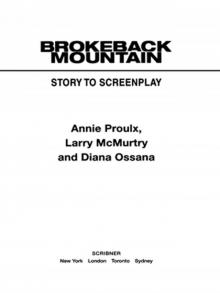 Brokeback Mountain
Brokeback Mountain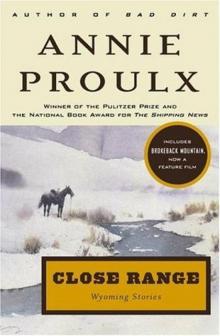 Close Range
Close Range That Old Ace in the Hole
That Old Ace in the Hole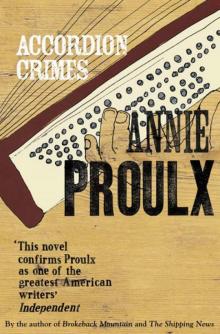 Accordion Crimes
Accordion Crimes Heart Songs and Other Stories
Heart Songs and Other Stories The Shipping News
The Shipping News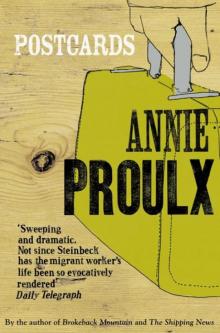 Postcards
Postcards Bird Cloud
Bird Cloud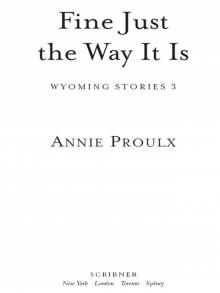 Fine Just the Way It Is
Fine Just the Way It Is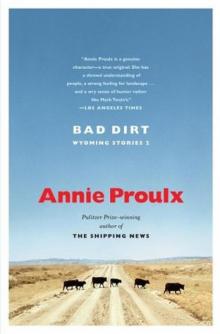 Bad Dirt
Bad Dirt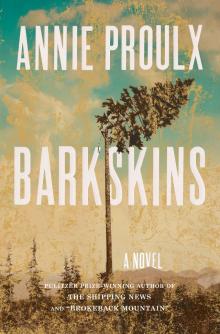 Barkskins
Barkskins BrokebackMountain
BrokebackMountain Bird Cloud: A Memoir of Place
Bird Cloud: A Memoir of Place Shipping News_A Novel
Shipping News_A Novel